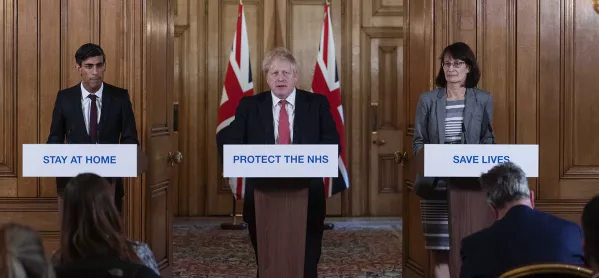How are you coping with those mind-numbing coronavirus briefings from Number 10?
You know - the ones where hapless ministers trot out the latest set of dodgy figures?
They boast of X zillion tests carried out (with less certainty on how many were analysed successfully) and billions of sets of PPE circulating in the country.
Then the medical experts give us details of travel, hospital admissions and deaths (although we’re now no longer allowed to see comparisons with other countries) and talk us through unlabelled graphs that wouldn’t be acceptable in a Y6 maths class.
While the latest escapades are perhaps some of the most egregious many of us can recall, it’s hardly the first time I have written about glaring examples of government hypocrisy or dishonesty: usually involving a glaring lack of moral leadership.
Undermining key messages
In school, such instances are keenly felt: not personally, but on behalf of students. One of the functions of a school - a prime purpose, surely - is to provide a moral framework within which children can learn and grow.
Without that, all those achievements - exam grades, even university places - are of limited worth.
I always felt that those of us who occupied the assembly platform, for example, had a duty to remind everyone (not just the children) of the values that drove the school.
By contrast, successive Westminster scandals, lies or cover-ups have always seemed to me to undermine the positive moral messages that schools have a duty to promote.
No change there, then, as current events are demonstrating. The senior advisor to the prime minister breaks the spirit (and, some three-quarters of the population reckon, the letter) of a law he helped write.
When it becomes public, he won’t resign, the PM won’t sack him and ministers are obliged to perform moral and rhetorical gymnastics in supporting the insupportable.
They always do.
Ill-judged advice
Meanwhile, that same government insists that schools must reopen: defies scientific opinion; provides incomplete guidance; airily announces target dates; specifies which year-groups should start back when; and adds inexplicable instructions like “no rota-system”.
Meanwhile, schools minister Nick Gibb declares that clinically vulnerable staff are in no danger and should turn up to school: they merely need to maintain distance.
I’d suggest maintaining a 260-mile distance: I’m given to understand that’s both safe and legal.
While policymakers are confused about the reasons for reopening schools (they never closed, remember), fail to identify their priorities (real education, or just childcare so parents can get back to work?) and remain hazy on details (just how do we do real school when socially-distanced?), there’s one fact on which they, however much they bumble and dissemble, can rely.
Schools will make it work, while government flounders. Teachers, support staff, school leaders: all will come together and somehow achieve the impossible, for the sake of the children.
And, at the same time, they’ll continue to give kids a moral compass when government creates only a vacuum.
They always do.
And for those of you who work those miracles, on the educational front line: you have my continued admiration.
You always have.
Bernard Trafford is a writer, educationalist, musician and former independent school headteacher. He tweets @bernardtrafford




